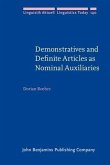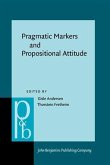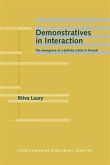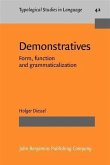Linking grammatical analyses with ideas about a shareable reality, this book investigates some fascinating ways in which nominal reference is exploited to meet interpersonal and rhetorical goals. It focuses on the use of demonstrative and possessive determiners in Polish discourse and proposes that the phenomenon of deixis be reexamined in the light of linguistic variation. The book illustrates a growing concern with the application of cognitive grammar to the study of situated language use and its social outcomes. What emerges is a new understanding of the role of deictic elements as tools for establishing intersubjective coordination and expressing attitudes.This book is for anyone actively seeking to understand how linguistic systems reflect human socio-cognitive abilities and in what ways reality is mediated through language.
Dieser Download kann aus rechtlichen Gründen nur mit Rechnungsadresse in A, B, BG, CY, CZ, D, DK, EW, E, FIN, F, GR, HR, H, IRL, I, LT, L, LR, M, NL, PL, P, R, S, SLO, SK ausgeliefert werden.









